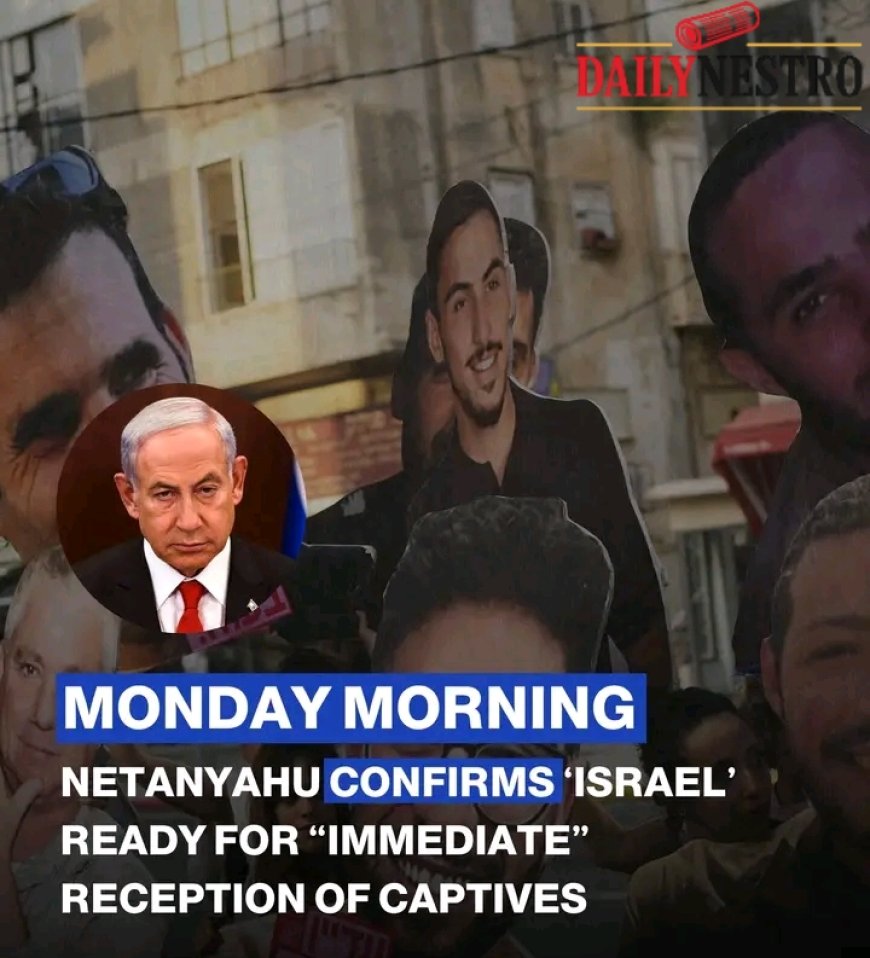Israel Prepares to Receive Hostages from Gaza as Major Exchange with Hamas Set for Monday
Israel Prepares to Receive Hostages from Gaza as Major Exchange with Hamas Set for Monday

Israel Prepares to Receive Hostages from Gaza as Major Exchange with Hamas Set for Monday
In a significant step toward de-escalation in the Gaza conflict, Israeli Prime Minister Benjamin Netanyahu announced on Sunday that Israel is ready to receive all hostages currently held by Hamas. This development comes as part of a high-stakes exchange deal under a temporary ceasefire agreement between Israel and the Palestinian group.
The exchange, which is set to take place on Monday, involves the return of Israeli hostages in exchange for the release of hundreds of Palestinian detainees. The move is being closely watched by the international community, marking one of the most substantial breakthroughs since the escalation of violence began over two years ago.
Netanyahu: Israel Ready for Immediate Reception of Hostages
Speaking through an official statement released on Sunday, Prime Minister Netanyahu emphasized Israel’s readiness to receive all captives held in Gaza.
"Israel is prepared and ready for the immediate reception of all our hostages,” he stated, expressing hope that this exchange will provide relief to the families of those who have been waiting in anguish.
This announcement follows media reports that Hamas has confirmed it will release both living and deceased hostages by Monday morning. Later updates indicated that the group expects the exchange to be completed by midday at the latest. According to Hebrew-language media outlets, Hamas has already begun the process of collecting the remains of deceased Israeli captives.
Details of the Prisoner Exchange Deal
As part of the agreement, Israel is set to release 250 Palestinian detainees. In addition, the deal includes the release of approximately 1,700 individuals from Gaza who have been detained since the beginning of the Israeli military campaign in the territory two years ago.
This exchange is being facilitated under a temporary ceasefire, which many hope will pave the way for further diplomatic efforts, including potential long-term ceasefire arrangements or even peace negotiations. However, analysts caution that the situation remains fragile and highly unpredictable.
Hamas Declines Role in Post-War Gaza Governance
While the hostage exchange marks progress on one front, the political future of Gaza remains uncertain.
A source close to Hamas’s negotiation team, speaking anonymously to Agence France-Presse (AFP), said on Sunday that Hamas will not participate in any form of governance in Gaza following the end of the war. The source stressed that the group considers the issue of governing the Strip a “closed file.”
“For Hamas, the governance of the Gaza Strip is a closed issue,” the source said. “Hamas will not participate at all in the transitional phase, which means it has relinquished control of the Strip. However, it remains a fundamental part of the Palestinian fabric.”
This statement signals a significant potential shift in the political landscape of Gaza, possibly opening the door for alternative Palestinian leadership, or a multinational or UN-backed transitional administration. Such a change could have wide-ranging implications for humanitarian aid, reconstruction efforts, and future peace processes.
International Reactions and Outlook
The international community has cautiously welcomed the news of the exchange. Human rights organizations, humanitarian agencies, and several governments have expressed hope that this exchange will lead to broader cooperation and steps toward ending the long-standing conflict.
The United Nations, European Union, and regional Arab powers have all emphasized the need for a sustainable solution that includes both a humanitarian response and a viable political resolution to the crisis in Gaza.
However, some observers remain skeptical, pointing out that similar agreements in the past have been short-lived. There are also concerns about whether all parties involved will fully adhere to the terms of the ceasefire and what mechanisms will be put in place to monitor its implementation.
What Comes Next for Gaza and Israel?
The coming days are expected to be critical. While the exchange is a positive development, many unanswered questions remain:
▫️Who will govern Gaza in the interim and long term?
▫️Will this ceasefire lead to a lasting truce or peace agreement?
▫️What role will international actors play in rebuilding and stabilizing the region?
As families on both sides await the return of their loved ones, the world watches closely. This exchange could either mark a turning point toward peace — or just another temporary pause in a deeply entrenched conflict.
Conclusion
The planned hostage and prisoner exchange between Israel and Hamas is a pivotal moment in the current conflict. While it brings some immediate humanitarian relief, especially for the families involved, it also raises new questions about the political and humanitarian future of Gaza.
With Hamas stepping back from governance and Israel signaling readiness to negotiate under certain conditions, the region may be entering a new phase — one that could lead to a more stable and peaceful future, if managed carefully.
The sources: Al-jazeera, The-Guardian







